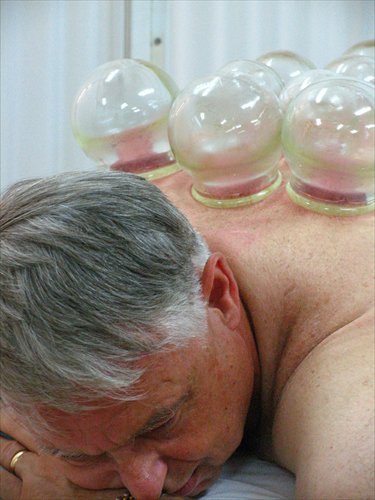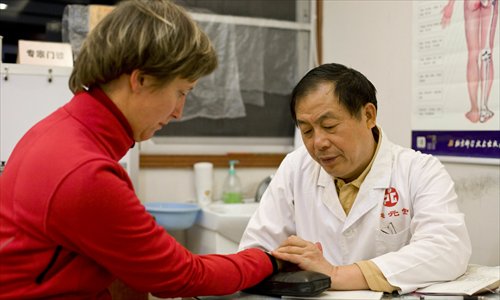TCM to the rescue
Foreigners flock to China for cancer, chronic disease treatments

More foreigners travel to China for TCM treatments after the Western approach to their ailment fails. Photo: IC
Alexandra Ivanovic, a 30-year-old school teacher from Serbia, has been taking Chinese herbal medicine prescribed by a doctor in China every day over the past two years. She was diagnosed with breast cancer by a hospital in her own country in 2012. The doctor gave her two choices - to remove her right breast or do chemotherapy.
"I was not married yet and would rather save my breast, so I went with chemotherapy," Ivanovic said.
However, she did not respond well to the chemo. Her white blood cell count dropped to dangerously low levels, and, unable to boost her immunity, her doctor later urged her to "get surgery in case the cancer cells spread to other organs."
That was when she heard about traditional Chinese medicine (TCM). After doing some research and speaking to a few people, Ivanovic flew to China and met with a TCM specialist in 2013. Since then, she started taking TCM and has seen remarkable results. It has reduced the effects of her chemotherapy and encouraged her body to heal itself.
More foreigners are traveling to China to receive TCM treatment or experience Chinese medicine as a tourist. Dr David Cai, Chairman of Oriental Inter-Cultural Medical, said that his clinic in Beijing on average receives around 1,000 foreign patients every month. Of that number, he said, around 10 percent are foreigners who specifically come to China for TCM treatment and another roughly 30 percent come for TCM medical tourism. The number increased by 20 percent last year compared with 2014.

A tourist undergoes cupping, a TCM treatment method, while visiting a local clinic. Photo: Courtesy of China Culture Center
Supplementary treatment for cancer
Many foreign patients resort to TCM when they are suffering from fatal diseases and don't have any other options.
Ivanovic learned of TCM from a former diplomat to China, a man who had successfully treated his esophagus cancer with TCM and was in remission for 10 years. She headed to China with similar hopes.
When she arrived in Beijing to meet with the TCM specialist the man recommended, Ivanovic was having trouble eating, and her white blood cells were so low that she was unable to continue chemotherapy without risking contracting a complicated infection.
The TCM doctor suggested that Ivanovic combine her chemotherapy treatment with Chinese herbal medicine and gave her a prescription. He saw her four times before she returned to Serbia with two months' supply of medicinal materials.
"I didn't understand what those materials were. I remembered there were things like astragalus and ganoderma, more than 20 ingredients. The doctor said that they would help me with the bad reactions from the chemotherapy and increase my white blood cell count," Ivanovic said.
After drinking the Chinese herbal medicine every day, her white blood cells started to increase. Two months later, she could go back to chemotherapy.
The TCM doctor would keep in contact with her for another two years, treating her remotely by asking her to send pictures of her face, tongue, and the area with the tumor, and sending her prescriptions. With help from both TCM and Western therapies, her cancer is now under control.
Wang Zemin, a TCM doctor at Wangjing Hospital in Beijing, has specialized in treating tumors and blood diseases with TCM methods for over 30 years. He has seen many foreign patients who travel to China specifically for TCM treatment and has been invited to many countries to treat patients who were too ill to come to him.
Based on his experience, he said with serious diseases like cancer, it's best to combine Western and Chinese medicine to recuperate.
"Western medicine focuses on the size and position of the tumor, while TCM regulates yin and yang, supports the body's resistance, and makes the body heal itself. In TCM theory, we understand that cancer is caused by the yin-deficiency of spleen and kidney," said Wang.
He said in TCM practice, doctors use ingredients like Chinese yam, wheat seed and wolfberries to strengthen the spleen and kidney, minimize the reactions to chemotherapy, and help the patients to recover.
The use of chemotherapy alone can cripple the body's immunity and patients have been known to die from chemotherapy treatments, he said.
According to a study by the National Confidential Enquiry into Patient Outcome and Death based in the UK, of 600 patients who died within 30 days of treatment, 27 percent had their deaths hastened or caused by chemotherapy.
Western medicine, too, is waking up to the idea that TCM can be an effective tool in the fight against cancer.
In 2000, the US Food and Drug Administration approved the use of arsenic trioxide, a compound traditionally used in Chinese medicine, in the treatment of leukemia. And, prestigious universities such as Yale have also started their own TCM research on a four-herb combination called huang qin tang, discovered over 1,800 years ago by Chinese herbalists, that can enhance the effectiveness of chemotherapy in patients with colon cancer, an April 2012 Wall Street Journal report said.

TCM tourism is a way for foreigners to improve their health while learning more about Chinese culture. Photo: IC
Relief for chronic ailments
Foreigners also use TCM to treat chronic diseases.
A Russian woman named Yelena came to Beijing four times a year to treat her rheumatoid arthritis with acupuncture, an April 2014 Xinhua News Agency report said.
The woman was suffering from arthritis pain for 10 years before finding relief through acupuncture. Each visit, she would stay in Beijing for a week for acupuncture sessions, herbal medication, and soak in hot springs in Changping district, the report said.
"Before that, I had been trying physiotherapy for three years, but my joints were still in pain after the treatment," she was quoted as saying.
After more than a year of TCM treatment, Yelena recovered. However, she still drinks herbal tea, as prescribed by her Chinese doctor, "to clear out the dampness in my body to stay healthy."
Wang said TCM has proven to be effective in treating many chronic illnesses. "The advantage of TCM in treating chronic diseases is that it doesn't have any side effects like Western medicine," Wang said. "And unlike Western medicine, which can only temporarily relieve the symptoms, it can get to the bottom of the disease and cure it permanently."
For example, in treating diabetes, instead of injecting insulin or taking other medicines to stimulate the pancreas, TCM aims to help the pancreas grow stronger and produce its own insulin, Wang said.
TCM tourism
There are also a lot of foreigners who explore TCM as a part of a tourism package in China. For them, it is a way to improve their body functions while exploring the medicinal side of Chinese culture.
Kseniya Tsoy, 28, who works at a trade company in Uzbekistan, falls into this category. She tried TCM during her trip to China last June.
"I hurt the tendons in my knees during a hike in 2014. The doctor in my country said nothing can be done except to rest and limit sporting activities for at least half a year," she said.
She took the advice, and her knees got better at first, but whenever she did any strenuous exercise, they would hurt. Then, when she traveled to China, all the walking during the tour aggravated her condition to the point where she was literally limping around. "My tour guide, who is an American, suggested that I sign up for their TCM tour and try acupuncture," Tsoy said. "We went to a local clinic and the shifu (TCM doctor) looked at and tapped my knees for a while. He then prescribed three acupuncture sessions, but my stay in China only allowed me to get two."
Tsoy was worried that it wouldn't work because she didn't get the full session, but her pain disappeared after the two sessions. "It was magical. It only cost 300 yuan ($45.6), and I didn't take any medicine, so there were no side effects," Tsoy said. "I would like to try TCM again if I have some other conditions in the future."
Many places in China are offering TCM tourism services and plan to further expand it.
The China Culture Center, an agency that offers culture and travel packages to foreigners, started to offer TCM tours in 2000 and receives around 300-400 travelers each year for its TCM tour, Feng Cheng, one of its founders, told Metropolitan.
"Generally, foreign travelers are more interested in massages, acupuncture and cupping because they can immediately feel the results of the treatment," he said. "Most foreign travelers are not very interested in herbal medicine because they don't believe in the philosophy behind it."
"The biggest obstacle in attracting foreign travelers to TCM is they don't understand how TCM works. In the future, I think agencies like ours and hospitals should focus more on introducing the theories behind TCM to let foreign travelers better understand how TCM can help people," Feng said.